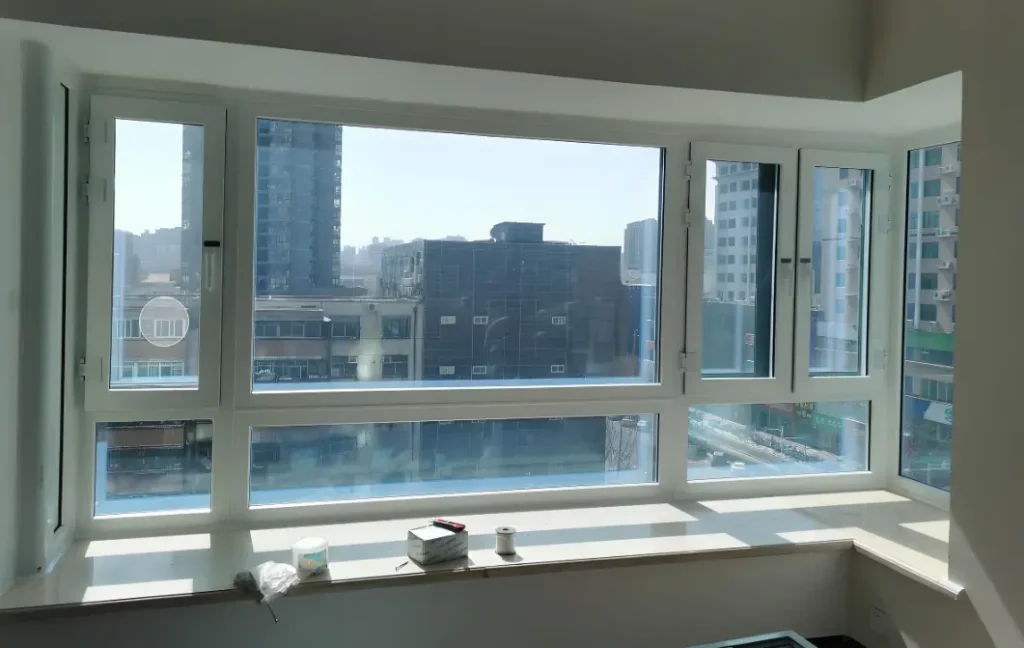Do you live in a noisy area? Maybe you hear cars, people, or construction outside your home. If you want a quieter home, custom windows can help! Windows play a big role in how much noise gets into your house. By choosing the right windows and making a few changes, you can reduce the noise and make your home peaceful.
In this guide, we will explain how to improve noise reduction with custom windows. We will talk about different types of windows, materials, and other tips to block out unwanted sounds.

Why Do We Hear Noise Through Windows?
Windows are one of the weakest points in a house when it comes to sound. Sound travels through air and solid objects like glass. If your windows are thin or have gaps, noise can easily get inside.
Here’s why:
- Thin Glass: Single-pane windows are not thick enough to block sound.
- Gaps: If there are gaps around the window frame, sound can sneak in.
- Air Leaks: Air leaks let sound travel through the cracks.
To stop noise, you need windows that are designed to block sound. Custom windows can be made with special materials and features that reduce noise.
Types of Windows for Noise Reduction
There are different types of windows that help reduce noise. Let’s look at some of the best options:
| Window Type | How It Helps |
|---|---|
| Double-Pane Windows | Two layers of glass with air in between help block sound. |
| Triple-Pane Windows | Three layers of glass provide even better noise reduction. |
| Laminated Glass | A layer of plastic between two pieces of glass absorbs sound. |
Double-Pane Windows
Double-pane windows have two layers of glass with a small space between them. This space acts as a barrier to sound. The air or gas between the panes helps stop sound waves from passing through.
Triple-Pane Windows
Triple-pane windows take it a step further by adding a third layer of glass. The extra layer makes these windows even more effective at blocking noise.
Laminated Glass
Laminated glass has a special plastic layer between two pieces of glass. This plastic layer helps absorb sound and makes it harder for noise to get through. Laminated glass is often used in areas with lots of traffic or loud noises.
Materials That Help Block Noise
The material your window is made from also affects how much noise gets in. Let’s look at some common materials:
- Wood: Wood is a great natural insulator and helps block sound.
- Vinyl: Vinyl frames can have air pockets that help reduce noise.
- Fiberglass: Fiberglass is strong and can be filled with foam for extra insulation.
- Aluminum: Aluminum is lightweight but not as good at blocking sound as wood or vinyl.
If you want the best noise reduction, choose heavier materials like wood or fiberglass.
How Custom Windows Can Reduce Noise
Custom windows are made just for your home. You can choose the size, shape, and materials that work best for you. Here’s how custom windows can improve noise reduction:
- Thicker Glass: You can choose thicker glass to block more sound.
- Multiple Layers: Add more layers of glass (double or triple panes) for better protection against noise.
- Special Coatings: Some custom windows come with special coatings that help reduce sound.
- Tighter Seals: Custom windows fit perfectly into your window frame, reducing gaps where sound can get in.
Other Ways to Improve Noise Reduction
Besides choosing the right windows, there are other things you can do to reduce noise:
1. Seal Gaps Around the Window
Even the best windows won’t block all the noise if there are gaps around them. Use caulk or weatherstripping to seal any gaps around the window frame.
2. Install Window Inserts
Window inserts are extra layers that fit inside your existing window frame. They create an extra barrier against noise without replacing the entire window.
3. Use Heavy Curtains
Thick curtains made from heavy fabric can help absorb sound before it gets into your room.
4. Add Soundproofing Film
Soundproofing film is a thin layer that sticks to your window glass. It helps reduce vibrations and blocks some of the noise from outside.
5. Install Acoustic Panels
Acoustic panels are specially designed to absorb sound waves. You can place them around your windows to reduce echo and outside noise.
Comparing Different Window Options
Here’s a quick comparison of different window options for reducing noise:
| Feature | Double-Pane Windows | Triple-Pane Windows | Laminated Glass Windows |
|---|---|---|---|
| Number of Glass Layers | 2 | 3 | 2 + Plastic Layer |
| Noise Reduction Level | Good | Better | Best |
| Cost | $$ | $$$ | $$$$ |
| Energy Efficiency | Good | Better | Good |
| Best For | Moderate Noise | High Noise | Very High Noise |
Benefits of Reducing Noise with Custom Windows
Why should you invest in custom windows for noise reduction? Here are some benefits:
- Better Sleep: Less outside noise means better sleep at night.
- More Privacy: Custom windows block not just sound but also prying eyes.
- Energy Savings: Many custom windows also improve energy efficiency by keeping heat inside during winter and outside during summer.
- Increased Home Value: Installing high-quality custom windows can increase the value of your home.
- Peaceful Environment: With less noise, your home becomes a peaceful place where you can relax and enjoy quiet time.
Cost Considerations
Custom windows designed for noise reduction tend to cost more than standard windows because they use special materials and technology.
Here’s an estimate of what you might pay:
- Double-pane window: $300 – $800 per window
- Triple-pane window: $600 – $1,200 per window
- Laminated glass window: $950 – $1,500 per window
While these prices may seem high, remember that they offer both noise reduction and energy savings over time.
DIY vs Professional Installation
You might be wondering if you can install these custom windows yourself or if you need a professional. Here’s what to consider:
DIY Installation
- Cheaper upfront cost
- Requires tools and experience
- Risk of improper installation (which could lead to poor performance)
Professional Installation
- Costs more but ensures proper installation
- Professionals know how to seal gaps correctly
- May come with warranties
For the best results, it’s usually worth hiring a professional installer who has experience with custom windows designed for noise reduction.
Frequently Asked Questions (FAQs)
Q1: Can I make my current windows quieter without replacing them?
Yes! You can add window inserts, use thick curtains, apply acoustic caulk around gaps, or install soundproofing film on your existing windows.
Q2: How much quieter will my house be with custom windows?
Custom windows can reduce outside noise by up to 50% or more depending on the type of window and materials used.
Q3: Are triple-pane windows worth it?
If you live in an area with lots of traffic or loud noises (like near an airport), triple-pane windows offer excellent noise reduction but come at a higher cost than double-pane options.
Q4: What is laminated glass?
Laminated glass has two pieces of glass with a plastic layer between them that absorbs sound waves and reduces outside noise effectively.
Conclusion
Custom windows offer one of the best ways to reduce unwanted outside noises in your home. By choosing double-pane, triple-pane, or laminated glass options along with proper installation techniques like sealing gaps and using heavy curtains or inserts, you can create a quieter living space that promotes relaxation and peace.
Whether you’re dealing with city traffic sounds or noisy neighbors, investing in custom-made soundproofing solutions will make your home more comfortable while also boosting its value over time!










